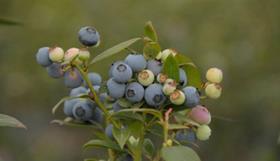
The first commercial blueberry variety to be developed in Argentina has been registered with the National Seed Institute.
Naike was selected from 20,000 new genotypes as part of the varietal improvement programme, a collaboration between the Agronomy Faculty at the University of Buenos Aires (Fauba) and Tucumán-based grower-exporter EarlyCrop.
According to Gustavo Schrauf, professor of Fauba’s department of genetics, a further two varieties will be registered shortly.
Naike was selected because of its high productivity, favourable marketing window, long postharvest life and exceptional taste. “It has been developed for the Tucumán area, where its production peak coincides with the most profitable sales window in international markets – principally the US, although demand in China has also started to grow,” Schrauf says. “Furthermore, in this area of Tucumán you get twice the yield than in other regions of the country.”
In trials, Naike has produced yields 10-15 per cent higher than commercial varieties used as a control. But Schrauf warns that further evaluations are necessary in different productive environments.
Fauba launched the varietal improvement programme in 2009. “Our aim is to obtain varieties adapted to local growing conditions, with a good flavour (combining high brix and low acidity), adequate berry size, high yield and long shelf-life, since 90 per cent of Argentina’s blueberry production is exported to the Northern Hemisphere, mostly by sea,” explains Pablo Peralta, the professor and researcher at the department of genetics who is overseeing the programme. “Naike meets every one of these requirements.”
EarlyCrop’s technical manager, Luis Taquini, says developing high quality varieties will also help to consolidate sales in the local market, where consumption continues to grow steadily.
The programme selects genetic material from Southern Highbush varieties for micropropagation at Fauba’s facility in Buenos Aires. Once propagated, the seedlings are transferred to Tucumán for planting and evaluation.
Fauba is already evaluating several other promising varieties, which it hopes to register in the coming years.
“Before the end of the year we will register two other blueberry cultivars, selected for their yield and large berry size,” Schrauf affirms.
“We think one of these cultivars will adapt very well to the productive zone of Entre Ríos, with yields above those obtained by other materials at present. The other cultivar has a different cycle and is more tolerant of frosts typical of that region.”



